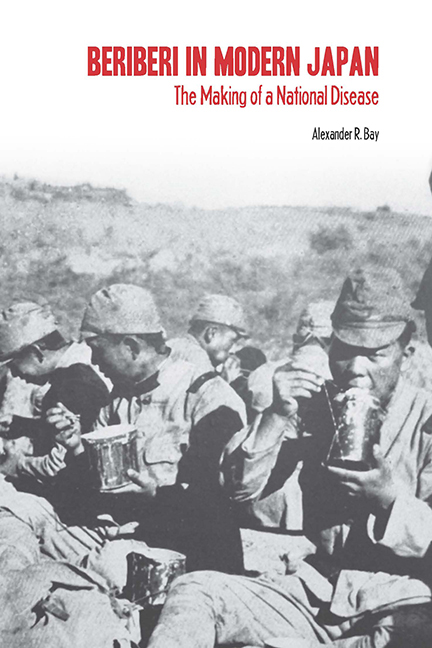Book contents
- Frontmatter
- Dedication
- Contents
- List of Illustrations
- Acknowledgments
- Introduction: Medicine, Power, and the Rhetoric of Empire
- 1 The Geography of Affliction: Beriberi in Edo and Tokyo
- 2 Putting the Laboratory at the Center
- 3 Beriberi: Disease of Imperial Culture
- 4 Empire and the Making of a National Disease
- 5 The Science of Vitamins and the Construction of Ignorance
- 6 The Rice Germ Debate: Total Mobilization and the Science of Vitamins in the 1930s
- Conclusion
- Notes
- Bibliography
- Index
2 - Putting the Laboratory at the Center
Published online by Cambridge University Press: 08 April 2017
- Frontmatter
- Dedication
- Contents
- List of Illustrations
- Acknowledgments
- Introduction: Medicine, Power, and the Rhetoric of Empire
- 1 The Geography of Affliction: Beriberi in Edo and Tokyo
- 2 Putting the Laboratory at the Center
- 3 Beriberi: Disease of Imperial Culture
- 4 Empire and the Making of a National Disease
- 5 The Science of Vitamins and the Construction of Ignorance
- 6 The Rice Germ Debate: Total Mobilization and the Science of Vitamins in the 1930s
- Conclusion
- Notes
- Bibliography
- Index
Summary
When the Meiji Emperor (r. 1868–1912), who had suffered several bouts of beriberi as a young man, fell ill with the disease again in May 1878, the Minister of the Right Iwakura Tomomi and Home Minister Itō Hirobumi met with Tōta Chōan (1819–89), a traditional medicine doctor and noted beriberi expert, to talk about his methods of treatment. Tōta advocated a provocative theory: white rice was the cause. His treatment centered on eating barley and red beans. In other words, he regarded the affliction as caused by diet, and cured it with a dietary regimen that dated back to the Sui and Tang dynasties in China. In 1878, Tōta became involved in a research project sponsored by the Emperor and the government—the Beriberi Hospital—where both Western and traditional medicine practitioners worked to find a cure for this disease.
The founding of an imperial-backed, state-sponsored hospital was an unexpected development for the cash-strapped government in 1878. The government had just put down Saigo Takamori's rebellion the previous year, and to make matters worse, the country was recovering from the cholera epidemic of 1877. Government funds, needless to say, were stretched thin. The medical historian Yamashita Seizō argues that within this financial context, “the impetus to build a beriberi research center could only have come from the emperor.”
The Beriberi Hospital was founded as a treatment center. Its research was based on the observations of patients, and its goal was to find a clinically effective treatment for beriberi. Physicians from the Faculty of Medicine and the Army Medical Bureau, however, were not interested in an institutional experiment that put traditional medicine on equal footing with Western medicine. Rather, they wanted research to take place within a university setting, putting the laboratory at the center of their scientific agenda.
In 1885, navy doctor Takaki Kanehiro and members of the Faculty of Medicine, and their allies in the Army Medical Bureau, commenced a debate about the etiology of beriberi. While the navy advocated clinical treatments, believing that a protein (nitrogen) deficiency caused the disease, the university and army doctors pursued laboratory experiments, trying to discover a disease-causing bacillus.
Commenting on the debate over beriberi etiology, the Yomiuri newspaper speculated that the experimental approach was likely to win.
- Type
- Chapter
- Information
- Beriberi in Modern JapanThe Making of a National Disease, pp. 30 - 51Publisher: Boydell & BrewerPrint publication year: 2012

